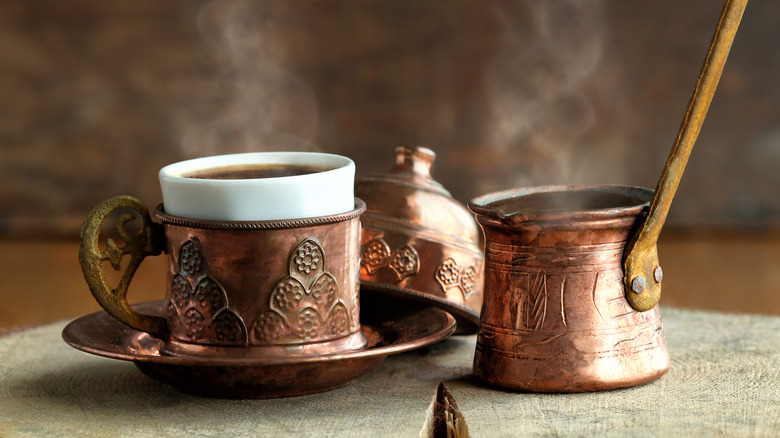The Biggest Mistake You're Making With Turkish Coffee
Coffee aficionados, take note. In the ever-expanding world of specialty coffee, one brewing method is finally beginning to get the attention it deserves. Cezve or ibrik coffee, commonly referred to as Turkish coffee, is one of the oldest coffee brewing methods in the world, per Java Presse. Coffee has evolved in waves, of which there have been three. The first wave established coffee as a commodity. The second wave began with the development of Starbucks, and we all know how that turned out. The current third wave is very much focused on places of origin, sustainability efforts, and creating specialty coffees (via Essence Coffee).
However, there likely wouldn't have been any waves of coffee at all if it weren't for the cezve. According to NPR, an enthusiastic Ottoman governor stationed in Yemen during the 16th century developed a great love for coffee brewed in cezve. He shared this enthusiasm with the reigning sultan, who popularized it in Istanbul and across the Ottoman Empire, which at its height reached into the Baltic States of Eastern Europe.
This method of brewing coffee is still immensely popular in the aforementioned regions, but really took off in the West with the Cezves/Ibrik Championship put on by World Coffee Events, per Java Presse. Known for its thick consistency and potential for bitterness, the development of Turkish coffee into a modern specialty means that painstaking efforts have been put into developing the perfect ibrik technique that will yield you a truly beautiful cup of coffee.
Don't boil your coffee
European Coffee Trip has an excellent video on YouTube on how to brew Turkish coffee and the pitfalls you may encounter when you try it out for yourself. Some mistakes they recommend avoiding when brewing with this method are using pre-ground coffee, starting off with cold water, and agitating your coffee too much. Agitating the coffee grounds by frequent stirring can cause over-extraction, leading to a bitter brew. However, there is one mistake that requires attention and increased skill with an ibrik to avoid — boiling.
According to Java Presse, boiling coffee in an ibrik is a big no-no. As Turkish coffee is brewed using coffee that is ground extremely finely, with the consistency of powdered sugar, and no filtration, getting the coffee to brew properly is key to an enjoyable cup. As you brew with the ibrik, you want the coffee to reach a point where it gets hot enough to build up foam, but not boil.
In traditional Turkish coffee making, you would do this three times, repeatedly taking the ibrik off and onto the heat. However, specialty coffee makers recommend foaming only once, as three times can lead to over-extraction and bitterness. Once the coffee is poured, let it sit for a few minutes to allow any remaining coffee grounds to make their way to the bottom of the cup. Then it's simply a matter of enjoying your coffee, preferably with a nice cube of Turkish Delight nearby.

